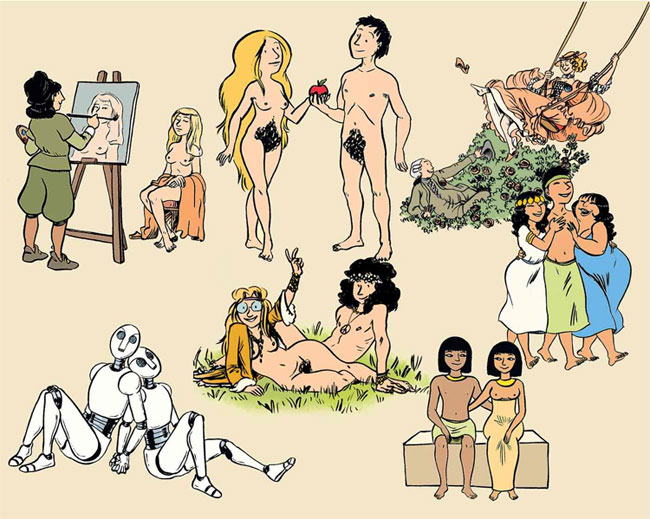Sex from the fear of 'sin' to the trend of modern freedom
In ancient times, sexuality was limited by religion, gradually, people were more open-minded and the future tended to be more liberal.
According to Livescience, birds do "that" , bees do "that" , people since the dawn of time did "that". But how has sex changed over the millennium and in the past decades? Do people do that much and get better? The home has discovered the concept of sex life changed over the years.
People are basically anatomically identical, for about 100,000 years, when our ancestors lived in caves."Just like the body says what we like to eat, when to go to bed, when we lie down, desire arises," said psychologist Edward Shorter of the University of Toronto. " Sex is related to the biological frame and always brings joy ."
Humans, including all animals, have instinctive nerves to search for sex and practice regularly.This can be considered a basic physiological need . According to researchers, people also have evolution of desire. Over time, people like sex more than 50,000 years ago.

The concept of sex life has changed over the years.(Photo: Theguardian).
However, there are opinions that reject this. Dr. Buss argues that there is nothing to prove that people have sex more than the past, just that today the issue of sex is more straightforward and free. In the past, cultural and religious restrictions strongly influenced our sexual history.
What people really experience is always a mixture of biological and social conditions: Desire surges from the body and mind. Sexualists agree that religion has a strong influence on the attitude of the mind towards the desire of the body. Men and women living in medieval times are certainly affected by the fear of sin, which reduces sexual desire and sexual pleasure.
By the second half of the nineteenth century, these obstacles began to be removed. A major breakthrough in sexual relations began as the beginning of sex in the Western world. With the industrial revolution that made many people closer together, in crowded neighborhoods at that time, chaotic culture, attitudes towards sex also became more free.
Sexual liberalization began to intensify in the 1960s with the advent of, allowing women to have the joy and the desired action without fear of what was not. Women do not consider sexuality with reproductive function but need to satisfy themselves.
However, according to the researchers, sexual trends are increasingly different in attitudes in each country around the world. The Swedes have many sexual partners in life, while the Chinese often have very few.
A 2005 global sex survey found that only 3% of Americans have monotonous sex lives, while Indians are 26%, Norwegian 53% and Portuguese 81%.
In the future, what if society is more open? Scientists predict sex will be a comfort that we have not imagined.
- 7 most common fears in the world! Try reading if you have a friend in it?
- Fear of confusion
- 6 ways to help you control fear
- Obsessive fear in the world?
- 8 bizarre fears of humans
- Strange fear syndrome that you may be suffering from but don't know how to call
- The baby alone played with snakes and the scientific solution behind it
- Fears are available in the subconscious of humans
- 5 strange fear syndrome of people
- We are unreasonably scared!
- The main trend is web down PC
- Strange fears of people in life
 'Fine laughs' - Scary and painful torture in ancient times
'Fine laughs' - Scary and painful torture in ancient times The sequence of numbers 142857 of the Egyptian pyramids is known as the strangest number in the world - Why?
The sequence of numbers 142857 of the Egyptian pyramids is known as the strangest number in the world - Why? History of the iron
History of the iron What is alum?
What is alum?